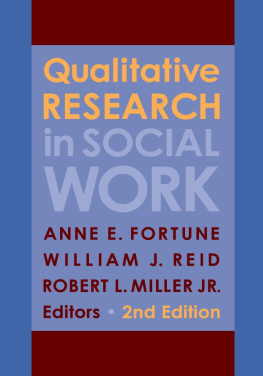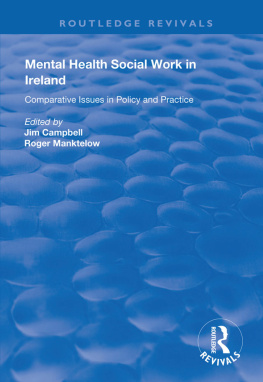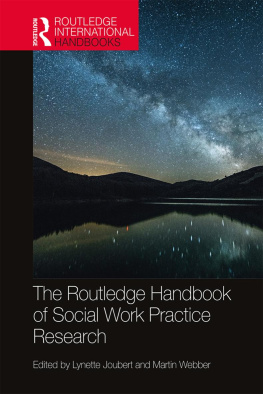Columbia University Press
Publishers Since 1893
New York Chichester, West Sussex
cup.columbia.edu
Copyright 2010 Columbia University Press
All rights reserved
E-ISBN 978-0-231-51264-0
Library of Congress Cataloging-in-Publication Data
Social work practice research for the twenty-first century / edited by Anne E. Fortune, Philip McCallion, and Katharine Briar-Lawson.
p. cm.
Includes index.
ISBN 978-0-231-14214-4 (cloth : alk. paper)ISBN 978-0-231-51264-0 (electronic)
1. Social serviceResearch 2. Evaluation research (Social action programs) I. Fortune, Anne E., 1945 II. McCallion, Philip. III. Briar-Lawson, Katharine. IV. Title.
HV11.S5886 2010
361.3'2dc22 2009042015
A Columbia University Press E-book.
CUP would be pleased to hear about your reading experience with this e-book at .
References to Internet Web sites (URLs) were accurate at the time of writing. Neither the author nor Columbia University Press is responsible for URLs that may have expired or changed since the manuscript was prepared.
Anne E. Fortune, Philip McCallion,
and Katharine Briar-Lawson
AT A TIME WHEN society faces serious social, economic, and planetary problems, the social work profession struggles to redefine its role in reducing those problems and their impact on individuals. At the same time, the pursuit of social good is no longer a valued outcome in itself. The profession must demonstrate its relevance and effectiveness to a broad constituency of legislators and the public as well as to clients and practitioners. An important asset is research on social work practice: research on what social workers actually do; variations; benefits; the processes, cultural competences, and ethics of practice; and effectiveness. Still, despite forty years of emphasis on empirically based clinical practice, the promotion of clinician-scientists, development of infrastructure for agency-based research, and more recently Evidence-Based Practice (EBP), the amount of intervention research comes up perilously short (Fraser 2004). The needs of underserved, diverse, and culturally identified populations are often poorly addressed.
This book provides a direction for social work practice research by reviewing the recent history of empirical practice, summarizing current knowledge in key areas, tracing an empirically developed social work model (task-centered practice), and developing an agenda for research in the twenty-first century. The book is a tribute to William J. Reid (19282003), a social work scholar who influenced social work in several areas: 1) with Laura Epstein, developing an evidence-based intervention model (1972) (see for a description of the task-centered model); 2) systematizing research methods and disseminating them to social workers (Research in Social Work, Reid and Smith, 1981); 3) integrating many approaches to research while other scholars squared off in epistemological debates; 4) assiduously promoting empirically based practice long before its current cachet; and 5) more recently, synthesizing intervention knowledge and framing an agenda for future research (Reid 2000; Reid, Kenaley, and Burton 2004).
Part 1 reviews the development of social work research. Ronald A. Feldman () summarizes the contributions of qualitative research. Qualitative research enables one to study individual outcomes (not evaluate a program) and advance an emancipatory research agenda. It shifts research questions from academicians concerns to those that sufferers and survivors think are central (page 35).
The second part of the book includes summaries of the current state of the art in key fields of social work service. EBP is currently defined in two ways. One way is practice that uses knowledge and interventions with research validation (Gellis and Reid 2004). This approach is sometimes called EBP as a noun or product (Proctor 2009), evidence-supported intervention (ESI), or evidence-supported treatment (EST) (Danya International 2008). It assumes that intervention guidelines can be crafted from available data or have been tested with randomized trials of manualized interventions. In most of social work, such forms of EBP are organized by problem or field of practice. This second part includes evidence on work with small groups to resolve individuals problems (, June G. Hopps, Tony B. Lowe, and Ollie G. Christian).
A second definition of EBP is as a process for practitioners to generate case-relevant questions and then find the evidence for effective intervention, normally using bibliographic and (now) computerized searches (Gellis and Reid 2004). Proctor (2009) calls it EBP as a verb or process. This approach, championed in social work by Gambrill (1999) and Gibbs (2003), assumes that each practitioner will be an efficient retriever and critic of relevant research. Following this definition of EBP, Julia Littell () discusses the science of research synthesis: how to conduct a systematic literature review that reduces bias, the international efforts to make such systematic reviews readily available through the Cochrane and Campbell Collaborations, and misinterpretation when systematic review is not implemented.
The third part maps the development and dissemination of social works only homegrown empirical practice model, Reid and Epsteins task-centered model for work with individuals, families, groups, administration, and supervision. Lynn Videka and James Blackburn () outline Reid (and Epsteins) contributions to social work practice research. Reid used research and development (R&D) (Thomas and Rothman 1994) over forty years to build a model with an eclectic, pragmatic, and above all empirical approach. The model generated much dismay among social work practitioners when it was introduced in the late 1970s. Ideas that were controversial in the then-dominant psychosocial practice community included focusing on client-acknowledged problems, focusing on delimited problems in living, taking action (tasks) to resolve problems, and practitioner collaboration with the client.
A focus on the task-centered model is important in the history of social work research because Reid was an early advocate of mixed research methods, integrating quantitative and qualitative approaches. He and colleagues used a wide variety of research approaches in developing the task-centered model. These included quantitative methods like small randomized clinical trials (e.g., Reid and Epstein 1972; Reid, Bailey-Dempsey, et al. 1995) and tests of discrete interventions like the task-implementation sequence (Reid 1975). Qualitative methods to develop and valididate new micro-interventions included content analysis of sessions (Reid and Bailey-Dempsey 1994), Interpersonal Process Recall (Naleppa and Reid 1998), and critical events analysis (Davis and Reid 1988). Indeed, as a harbinger of next steps in practice research in the twenty-first century, Reids last publication called for expanding the type of data used to support evidence-based practice to include practitioner-driven and local qualitative and quantitative research (Gellis and Reid 2004).
Subsequent chapters in part 3 focus on the dissemination of the task-centered model. Ronald H. Rooney (, Rita Elisabeth Eriksen). With support from government, professional organizations, and systematic training, the task-centered model became the central framework for most social services and child protection in those countries.

 NEW YORK
NEW YORK


